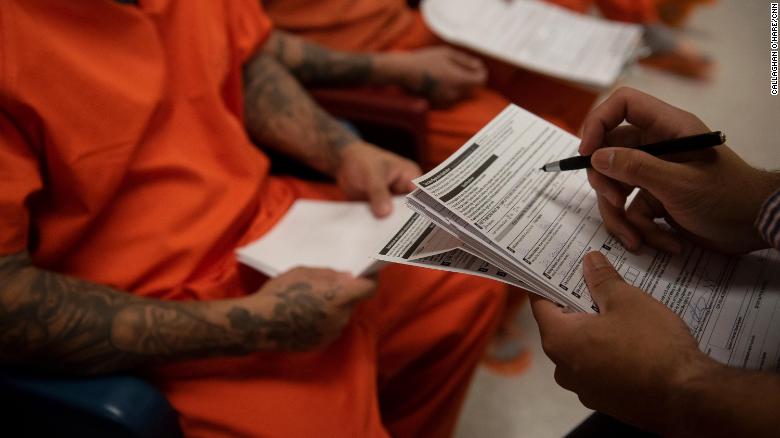A lower court ruling
previously found the law established an unconstitutional poll tax and unfairly discriminates against low income people who are unable to pay these fees.
Hundreds of thousands of people will now be denied the ability to cast a ballot in November.
While Bloomberg's actions are commendable, poll taxes on our democracy are unacceptable, and citizens shouldn't need to rely on the rich to ensure their voting rights.
Despite Bloomberg's generosity, the court has reinforced an unjust practice that is deeply tainted by the legacy of white supremacy and systemic racism. Across the country, according to research from the Sentencing Project,
millions of people -- disproportionately African Americans -- cannot go to the polls because they were previously convicted of a felony.
The
history of felony disenfranchisement laws is unambiguous. While the practice of restricting voting rights because of a criminal record originated in English common law prior to the American Revolution, laws restricting voting rights were widely instituted across the South following the Civil War. During the Jim Crow era, disenfranchisement laws systematically targeted Black men and undermined their political voice, effectively guaranteeing the economic and political marginalization of the Black community.
While many Jim Crow laws were
repealed in the wake of the Civil Rights Movement, felony disenfranchisement remained on the books and its impact grew exponentially as mass incarceration increased at the federal, state and local level. Over the past 40 years, according to the Sentencing Project's analysis of Bureau of Justice statistics, the prison population has
grown 500%. According to
that same study, Black Americans have been deeply harmed by these developments, with the lifetime likelihood of imprisonment for Black men born in 2001 an alarming one in three. For White men, that ratio is one in 17.
The implications are devastating. After conducting a 50 state analysis, The Sentencing Project found that 1 in every 13 Black Americans
has lost the right to vote due to felony disenfranchisement laws.
As the implications of these policies have become clear, a national movement to restore the right to vote to people with felony convictions has emerged. Since 1997, 25 jurisdictions have
enacted reforms to re-enfranchise individuals on probation, parole, or after completion of sentence. Nevertheless, in some instances politically-inspired measures have derailed this progress. The recent Florida court decision is a case in point. For decades, the state denied voting rights permanently to anyone with a felony conviction, impacting over one million people. But, in November 2018, Floridians overwhelmingly
voted to enfranchise most individuals upon completion of their sentence. It was a remarkable victory won by a powerful coalition led by formerly incarcerated advocates.
Then, months later, a Republican-dominated state legislature and Gov. Ron DeSantis
instituted the new law requiring payment of court fines and fees to access the polls -- essentially undermining the will of Florida voters. The lawsuit filed by disenfranchised Floridians, argued that the state had instituted an intentionally discriminatory policy, one akin to a "poll tax." Historically, poll taxes were used in the Jim Crow South to suppress the votes of poor, predominantly Black communities. In May, a district court judge found for the plaintiffs, referring to the new law as a "
pay-to-vote" system. But this month, in a
6-4 vote, a federal court reversed that decision. Notably,
five of the six majority judges were appointees of President Donald Trump.
Now,
700,000 people could be denied their chance to have a say in the November election. According to The Washington Post, Black people
account for 28% of that group, even though they constitute
just 15% of Florida's overall population.
The bedrock of any democracy is the right to vote. No democracy can survive when one group of people is disproportionately subjected to the coercive power of the police, prosecution, the courts and prisons -- and is consequently stripped of voting rights. It is crucial to eliminate felony disenfranchisement laws now, in addition to any rules that establish additional barriers to voting. Several states have taken steps to remove disenfranchisement laws for people with felony convictions who are now living in the community, and a federal bill, the
Democracy Restoration Act, would make these voting rights the law of the land for federal elections. But our democracy deserves even better. We need to safeguard the fundamental rights of all our people -- and this means that the right to vote must be preserved regardless of criminal justice status.
Indeed, voting rights should never be restricted for people in prison. That's not a radical idea -- Maine, Vermont,
Washington DC, and Puerto Rico
allow people to vote while behind bars, a process that has worked very smoothly. Unlike Republican leaders in Florida, a spokesman for Vermont's Republican Party
told NBC News in 2018, "The last thing we want to do is start putting up insurmountable barriers to participation in civic life because someone may have been convicted of a crime. People's right to vote is sacred." And, in Puerto Rico, polling sites are located within prisons and participation historically has been high.
Police, prosecutors, criminal courts and prisons should not be the arbiters of our voting rights. It's time to ensure all people can be full-fledged participants in our democracy.







